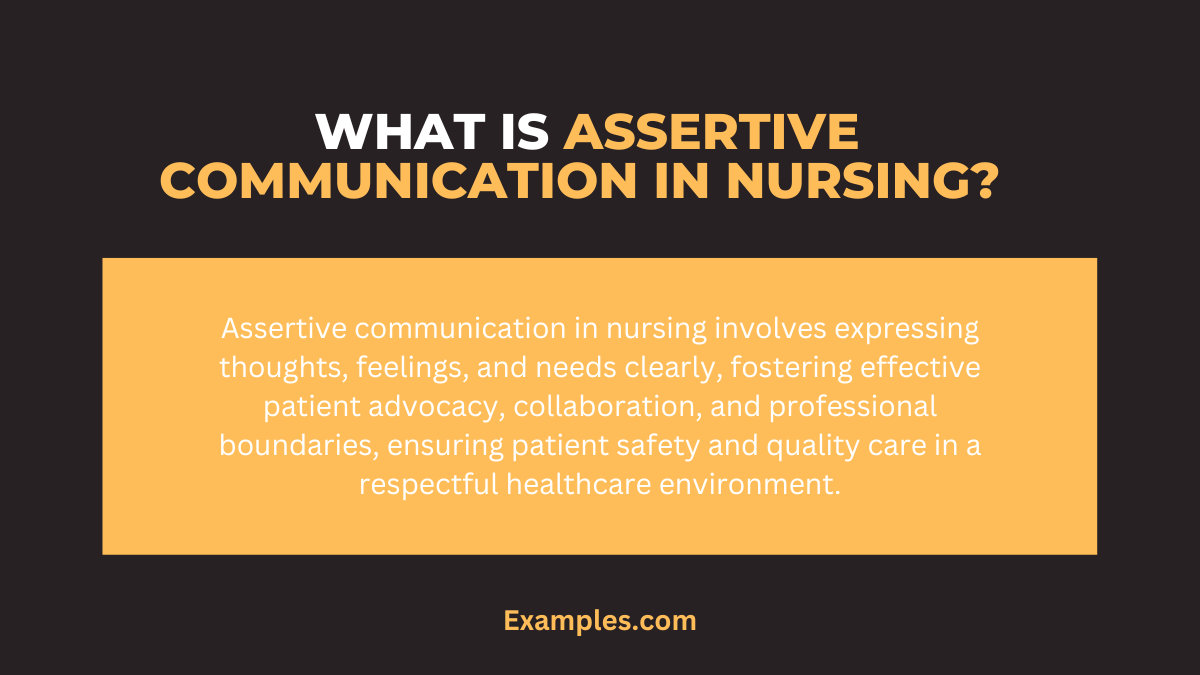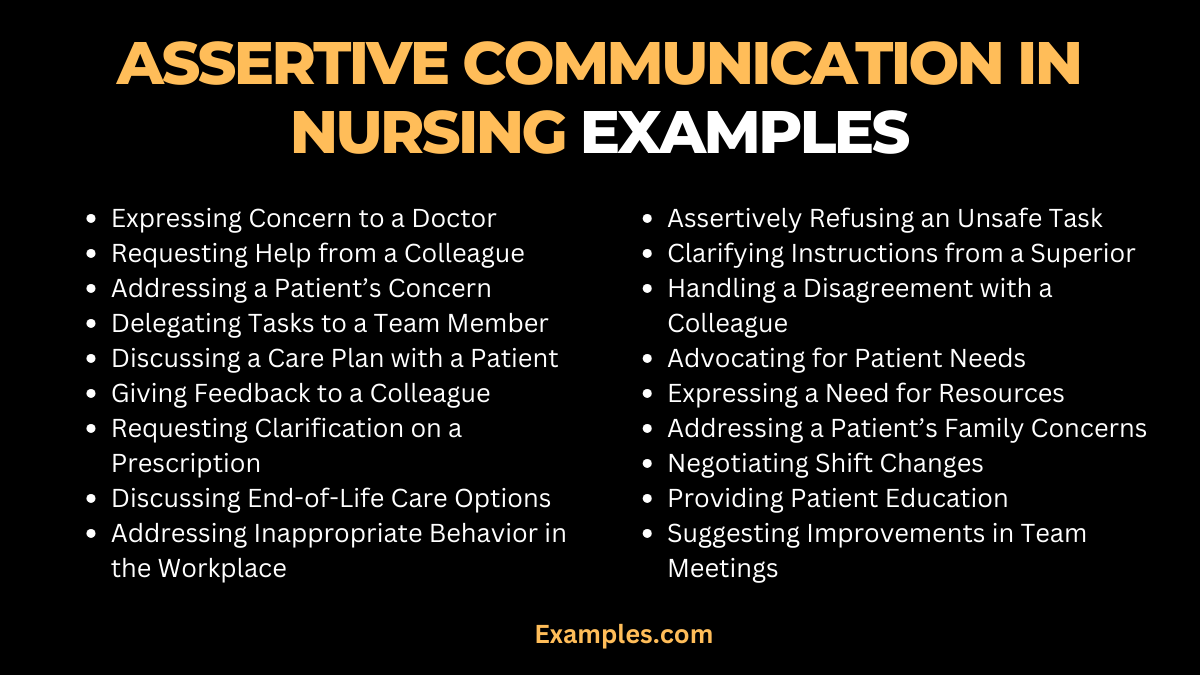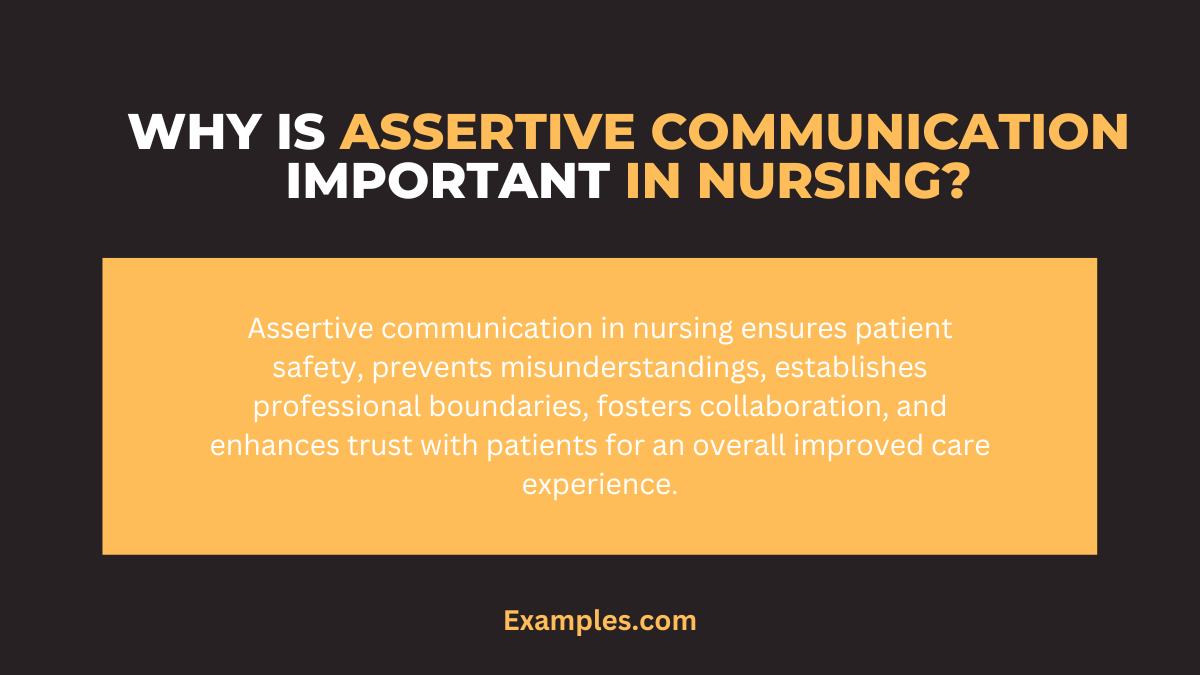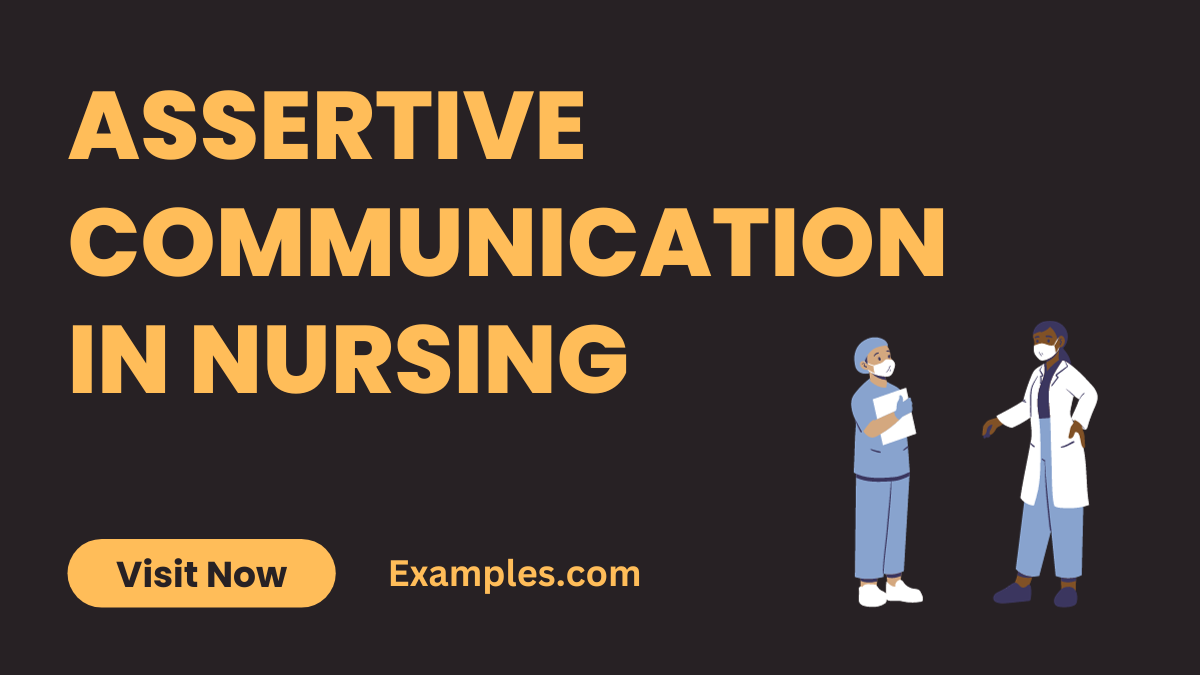Assertive Communication in Nursing
Mastering assertive communication in nursing is paramount for effective healthcare delivery. This complete guide delves into assertiveness with practical communication examples, providing insights tailored for healthcare professionals. Learn how assertive communication enhances patient care, fosters collaborative teamwork, and navigates challenging situations with poise. Elevate your nursing skills with real-world scenarios, ensuring your communication aligns with the highest standards of compassion and professionalism. Explore this guide for a comprehensive understanding of assertive communication, enriched with valuable communication examples.
What is Assertive Communication in Nursing?

Assertive communication in nursing is a key interpersonal skill that involves expressing one’s thoughts, feelings, and needs in a clear, direct, and respectful manner. In the healthcare setting, this communication style is essential for nurses as it helps them advocate effectively for their patients, collaborate with healthcare team members, and maintain professional boundaries. Assertive communication enables nurses to convey important information accurately and assertively, ensuring patient safety and high-quality care. This approach is distinct from passive communication, where a nurse might withhold their opinion, and aggressive communication, where they might dominate a conversation. By adopting assertive communication, nurses can ensure that their voices are heard while respecting the perspectives of others, thus fostering a collaborative and respectful healthcare environment.
20 Assertive Communication in Nursing Examples

Explore the power of assertive communication in nursing with 20 unique and impactful examples. Each example showcases effective techniques to enhance patient care, improve team collaboration, and foster a positive healthcare environment. Embrace these assertive communication strategies to elevate your nursing practice.
- Expressing Concern to a Doctor: “I have noticed unusual symptoms in patient X. I believe further tests are necessary for a comprehensive diagnosis.”
- Requesting Help from a Colleague: “Could you assist me with this procedure? Your expertise would be very beneficial.”
- Addressing a Patient’s Concern: “I understand your worries about the treatment. Let’s discuss it in detail to ease your concerns.”
- Delegating Tasks to a Team Member: “I need you to monitor patient Y’s vital signs while I administer medication to another patient.”
- Discussing a Care Plan with a Patient: “Let’s go over your care plan together. I want to ensure you’re comfortable and understand all aspects.”
- Giving Feedback to a Colleague: “Your approach in handling difficult situations is impressive. It really helps in maintaining a calm environment.”
- Assertively Refusing an Unsafe Task: “I cannot undertake this task as it falls outside my scope of practice and might compromise patient safety.”
- Clarifying Instructions from a Superior: “To ensure I’m on the right track, could you please clarify the instructions you provided?”
- Handling a Disagreement with a Colleague: “I see your point, but based on my experience, I suggest a different approach.”
- Advocating for Patient Needs: “This patient requires immediate attention. We need to prioritize their care right now.”
- Expressing a Need for Resources: “To provide the best care, we need more resources in this department.”
- Addressing a Patient’s Family Concerns: “I understand your concerns about your loved one’s health. Let’s discuss the treatment plan.”
- Negotiating Shift Changes: “I can cover your shift today, but I’ll need you to reciprocate next week.”
- Providing Patient Education: “Let me explain your medication regimen to ensure you understand how to manage your treatment.”
- Requesting Clarification on a Prescription: “I need to confirm the dosage on this prescription to avoid any errors.”
- Discussing End-of-Life Care Options: “Let’s discuss the available care options to ensure your loved one’s comfort and dignity.”
- Addressing Inappropriate Behavior in the Workplace: “Your comments were inappropriate and affected team morale. Let’s maintain a professional tone.”
- Suggesting Improvements in Team Meetings: “I propose we implement a new protocol to enhance our efficiency.”
- Reporting a Safety Concern: “I’ve noticed a safety issue that could affect patient care. It needs immediate attention.”
- Expressing Gratitude to a Team: “I appreciate everyone’s hard work and dedication in these challenging times.”
Assertive Communication in Nursing For Students Examples
Discover vital examples of assertive communication specifically tailored for nursing students. These examples are designed to enhance learning experiences, improve interactions in clinical settings, and prepare students for professional nursing roles. Each example is crafted with SEO and NLP-friendly keywords, ensuring an enriching educational journey.
- Asking for Clarification During Lectures: “Could you please explain the concept of patient-centered care again? I want to fully understand it.”
- Seeking Feedback on Clinical Skills: “I would appreciate your feedback on my IV insertion technique to improve my skills.”
- Participating in Group Discussions: “I have a different perspective on this case study. Let’s consider various patient care approaches.”
- Requesting Additional Practice in a Skill Lab: “Can I have extra time in the skill lab to practice catheterization for better proficiency?”
- Expressing Concerns About Workload: “I’m finding it challenging to manage coursework and clinical rotations. Can we discuss possible solutions?”
- Initiating a Study Group: “I’m starting a study group for our pharmacology exam. Would you like to join and collaborate?”
- Discussing Career Aspirations with a Mentor: “I’m interested in pediatric nursing. Could you guide me on the necessary steps to specialize in this field?”
- Addressing Misunderstandings with Peers: “I think there was a miscommunication about our group project roles. Let’s clarify and redistribute the tasks.”
- Seeking Opportunities for Clinical Exposure: “I’m eager to gain more experience in emergency care. Are there opportunities for additional clinical rotations in that department?”
- Requesting Guidance on Handling Stress: “I’m feeling overwhelmed with the clinical demands. Do you have any advice on managing stress effectively?”
Assertive Communication in Nursing For Resume Examples
Explore exceptional examples of assertive communication phrases for nursing resumes. These examples effectively highlight communication skills, showcasing the ability to handle patient care and teamwork in a professional setting. Incorporate these SEO and NLP-friendly examples to enhance your nursing resume.
- Demonstrating Team Collaboration: “Collaborated assertively within a multidisciplinary team to ensure optimal patient care.”
- Highlighting Patient Advocacy: “Advocated for patient rights and needs through clear and respectful communication with healthcare professionals.”
- Showcasing Conflict Resolution Skills: “Resolved conflicts among team members through assertive and constructive communication.”
- Illustrating Effective Communication with Patients: “Employed assertive communication techniques to educate and inform patients about their treatments and care plans.”
- Describing Leadership Abilities: “Led nursing teams with assertive communication, ensuring clear task delegation and effective team coordination.”
- Detailing Crisis Management: “Managed emergency situations with calm and assertive communication, ensuring patient safety and team preparedness.”
- Emphasizing Adaptability and Flexibility: “Adapted to rapidly changing healthcare environments by communicating assertively with team members and patients.”
- Conveying Efficiency in High-Pressure Environments: “Thrived in high-pressure settings by maintaining assertive and clear communication with the healthcare team.”
- Illustrating Patient-Centered Care Approach: “Focused on patient-centered care by assertively addressing patient concerns and queries.”
- Highlighting Continuous Learning: “Actively sought feedback and incorporated it into practice to enhance nursing care, demonstrating assertive and open communication skills.”
How Could You Be Assertive While Communicating in Nursing?
Being assertive in nursing communication involves clear, direct, and respectful expression of thoughts and needs. It’s about balancing empathy with straightforwardness. Nurses can achieve this by using “I” statements to express their viewpoints, actively listening to others, and maintaining a confident, yet non-confrontational tone. It’s important to state facts without exaggeration and to acknowledge the perspectives of others. Practicing body language that conveys confidence, like maintaining eye contact and a calm demeanor, also reinforces assertive communication. Regularly engaging in self-reflection and seeking feedback can help nurses continuously improve their assertive communication skills.
Why is Assertive Communication Important in Nursing?

Assertive communication is crucial in nursing as it ensures patient safety and effective teamwork. It allows nurses to clearly express patient needs, concerns, and treatment plans, avoiding misunderstandings that could lead to errors in patient care. Assertiveness also aids in establishing professional boundaries, preventing burnout and workplace conflicts. It fosters a collaborative environment where nurses feel confident to voice their opinions, contribute to decision-making, and advocate for their patients. Moreover, assertive communication is key in developing trust and rapport with patients, enhancing their overall care experience.
Tips for Effective Assertive Communication in Nursing?
- Use Clear and Concise Language: Avoid jargon when communicating with patients and be direct yet respectful with colleagues.
- Practice Active Listening: Show engagement and understanding in conversations to build trust and mutual respect.
- Maintain Positive Body Language: Use open gestures and maintain eye contact to convey confidence and receptivity.
- Employ “I” Statements: Frame your communications from your perspective to avoid sounding accusatory.
- Be Respectful of Others’ Views: Acknowledge different opinions and perspectives to foster a collaborative environment.
- Stay Calm and Composed: Even in stressful situations, maintaining composure can improve the effectiveness of your communication.
- Regularly Seek Feedback: Constructive feedback helps in refining communication skills and understanding how your message is perceived.
- Engage in Role-Playing: Practice different scenarios with colleagues to improve your assertive communication skills.
- Educate Yourself Continuously: Stay informed about best communication practices and adapt them to your nursing role.
- Set Clear Boundaries: Clearly communicate your limits and professional boundaries to colleagues and patients alike.
In conclusion, the importance of assertive communication in nursing cannot be overstated. It is a pivotal skill that enhances the effectiveness of healthcare delivery by promoting clear, direct, and respectful interaction among healthcare professionals and patients. This approach not only ensures patient safety but also fosters a collaborative and supportive work environment. Assertive communication in nursing is essential for conveying crucial information, advocating for patient needs, and maintaining professional boundaries within the healthcare setting.



